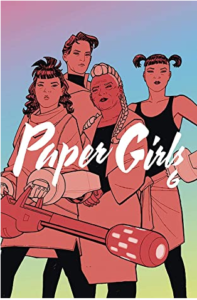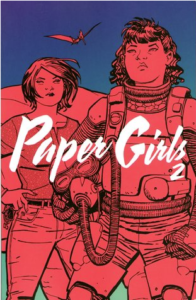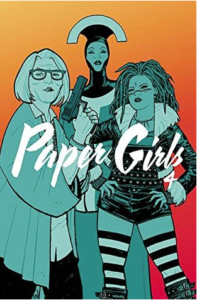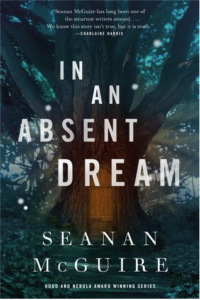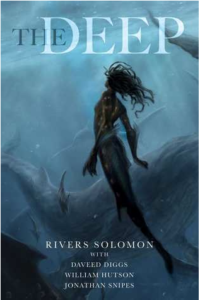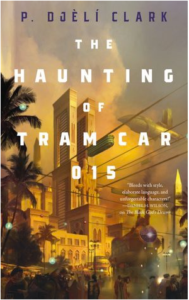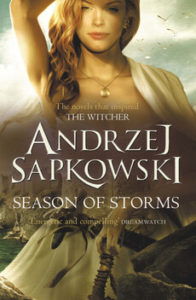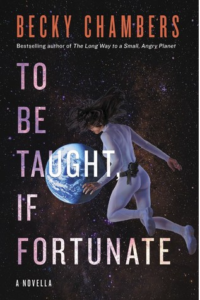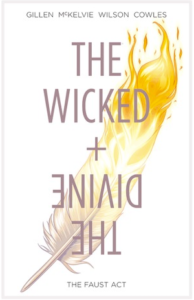 I had the weirdest visceral reaction after reading the first four volumes of this comic book and that is this: I felt young again, like a 20-something again, all over-sexed and full of energy and the certainty that I’m being misunderstood. Reading The Wicked + The Divine reminded me of waiting outside clubs in the cold, sometimes with groups but more often alone, and the relief of finally getting in and working my way up to the front then dancing and singing and being caught up in the absolute glory of whomever was performing on stage. Few of my friends enjoyed the same acts I loved, and fewer still wanted to come all the way to the front with me and engage in the Dionysian mob. Nowadays, I sit and watch from the sidelines like they used to — getting old is no joke — but I remember only too well the ecstasy of being part of a rapt, moving audience.
I had the weirdest visceral reaction after reading the first four volumes of this comic book and that is this: I felt young again, like a 20-something again, all over-sexed and full of energy and the certainty that I’m being misunderstood. Reading The Wicked + The Divine reminded me of waiting outside clubs in the cold, sometimes with groups but more often alone, and the relief of finally getting in and working my way up to the front then dancing and singing and being caught up in the absolute glory of whomever was performing on stage. Few of my friends enjoyed the same acts I loved, and fewer still wanted to come all the way to the front with me and engage in the Dionysian mob. Nowadays, I sit and watch from the sidelines like they used to — getting old is no joke — but I remember only too well the ecstasy of being part of a rapt, moving audience.
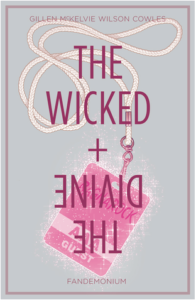 Anyway, that’s the buzz I got off these comics, and I suppose I should explain why. Apparently, every ninety years a new pantheon of twelve gods from world mythology is reborn to inspire the people, according to Ananke, the wizened old representative of necessity. She’s the one who wakes the slumbering god from the young adult, and welcomes them to the new world they’re facing. She also breaks the news that they can expect a lifespan of only two years, after which they burn out. In the year 2014, our pantheon choose to inspire as pop stars, based in London. In the first volume, Laura Wilson, a mixed race girl who loves all the pantheon, gets to meet Lucifer up close and personal, right before Luci is thrown in jail for murder. Laura is convinced she didn’t do it, so when the trial goes awry and Ananke is forced to shut down Luci in order to protect humanity, Laura is devastated.
Anyway, that’s the buzz I got off these comics, and I suppose I should explain why. Apparently, every ninety years a new pantheon of twelve gods from world mythology is reborn to inspire the people, according to Ananke, the wizened old representative of necessity. She’s the one who wakes the slumbering god from the young adult, and welcomes them to the new world they’re facing. She also breaks the news that they can expect a lifespan of only two years, after which they burn out. In the year 2014, our pantheon choose to inspire as pop stars, based in London. In the first volume, Laura Wilson, a mixed race girl who loves all the pantheon, gets to meet Lucifer up close and personal, right before Luci is thrown in jail for murder. Laura is convinced she didn’t do it, so when the trial goes awry and Ananke is forced to shut down Luci in order to protect humanity, Laura is devastated.
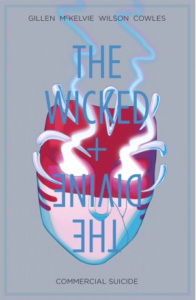 In Vol 2, Inanna shows up to comfort Laura. More than this, he inspires Laura to team up with abrasive investigative reporter Cassandra to find the real killers. At first, Laura is uncomfortable with the fame that the notoriety of involvement with Luci affords. But when Ananke awakens the twelfth god of the pantheon, Laura has to concede that she’d really hoped that her connection with Luci had somehow bestowed her with divinity, too. Of course, this is all before she discovers that Ananke is maybe full of shit, and at least one other member of the pantheon dies.
In Vol 2, Inanna shows up to comfort Laura. More than this, he inspires Laura to team up with abrasive investigative reporter Cassandra to find the real killers. At first, Laura is uncomfortable with the fame that the notoriety of involvement with Luci affords. But when Ananke awakens the twelfth god of the pantheon, Laura has to concede that she’d really hoped that her connection with Luci had somehow bestowed her with divinity, too. Of course, this is all before she discovers that Ananke is maybe full of shit, and at least one other member of the pantheon dies.
The third volume finds an array of guest artists taking over for six issues, as Baal recruits Beth, one of Cassandra’s former assistants, to help him find The Morrigan, in hopes she’ll lead him to Baphomet. The Morrigan claims she doesn’t know where he is, and Baal takes out his rage over the deaths of his fellow pantheon members on her before Woden intervenes to take her back to the special cell he’s built to imprison her in Valhalla. We then get an issue each focusing on a separate god, first Tara, then Woden, Amaterasu, The Morrigan + Baphomet, and Sakhmet.
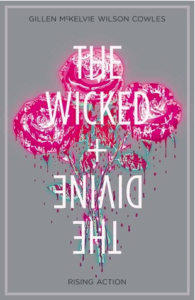 Finally, Vol 4 brings us the return of Persephone, who is ready to burn it all down in pursuit of vengeance. The question is, what happens once you’ve defeated the bad guy, especially when you still don’t know the bad guy’s motives?
Finally, Vol 4 brings us the return of Persephone, who is ready to burn it all down in pursuit of vengeance. The question is, what happens once you’ve defeated the bad guy, especially when you still don’t know the bad guy’s motives?
If you love mythology like I love mythology, then these books are totally your jam. If you’ve ever had and loved the experience of dancing in a sweaty club, your body and voice in unison with the music, these books are totally your jam (tho you might also need a love of mythology to help you keep tabs on the Who’s Who going on here.) If you love subversive critiques on divinity and stardom, fame and culture, you should absolutely get your hands on these books, because this creative team is absolutely knocking this sociological treatise in the guise of an action comic out of the park. Gosh, even their choices of guest artists was inspired, 100% fitting the tone of each issue they completed. Still tho, Jamie McKelvie’s art is perfect for the topic, and he and Kieron Gillen make for an amazing team. I’ve gushed elsewhere over my love for Matt Wilson’s colors and Clayton Cowles’ lettering, and they’re still in top form here. The challenge, I guess, is in seeing how they sustain this heading towards the Hugo-nominated Vol 9. I’ll be reviewing the next four volumes in another post, then concentrating on the last separately. Stay tuned!

